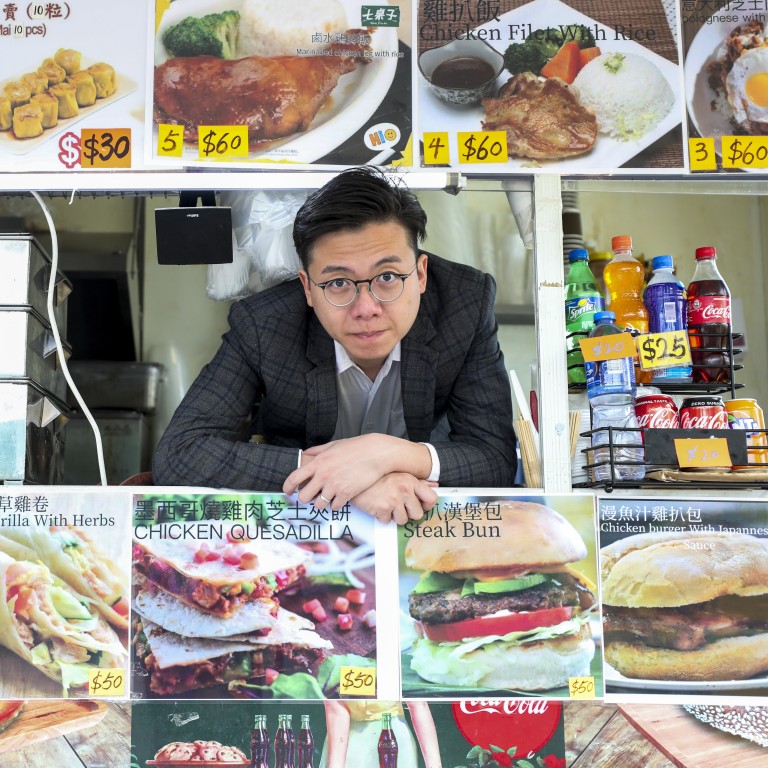
Hong Kong food truck boss hopes ‘yellow economy’ can power him to election victory
- Industry chairman Gordon Lam out to secure support of city’s catering operators as he explores bid to unset pro-establishment incumbent
- Lam also announces he has joined opposition Civic Party, but says talk of representing them in Legislative Council vote is premature
A food truck operator and member of Hong Kong’s pro-democracy camp has vowed to consider challenging the pro-government catering veteran in this year’s Legislative Council elections, if enough workers in the sector can be mobilised to register as voters to support the cause.
Riding on the emergence of the so-called “yellow economy”, Gordon Lam Sui-wa, who is also Hong Kong Food Truck Federation chairman, hopes to win the backing of some 5,000 like-minded food shop operators.
Lam announced his ambitious plan at a press conference on Tuesday where, flanked by party leaders and lawmakers, he also revealed he had joined the opposition Civic Party.
However, he stopped short of committing to represent the party to contest the seat in the functional constituency of catering in September’s poll.
“It is academic to talk about running or not at this stage,” Lam said. “The first thing we would like to do is to encourage like-minded food shop operators to register as voters first. If we can have enough voters, say, 5,000, I will consider running.”

Lam described himself as a pragmatic businessman, and believes both the “yellow” and “blue” camps would find him acceptable.
Shops and restaurants are now defined by those colours among anti-government protesters, with yellow businesses deemed to support their cause, and blue ones considered pro-government and police.
Lam accused Tommy Cheung Yu-yan, the incumbent catering sector legislator, of failing to speak up for small businesses.
“Many small businesses I came across said their voices are often ignored by Cheung,” Lam said.
Under the Legislative Council Ordinance, a holder of a food business licence, including meat hawkers at a wet market, can register to vote in the catering sector. But many of these small operators do not bother to register.
What happens to Hong Kong’s economy when businesses are split into ‘blue’ vs ‘yellow’?
At present, there are 4,408 voters in the catering functional constituency. In the 2016 general elections, Cheung, party chairman of the pro-business Liberal Party, won 2,438 votes to defeat his rival, chef Ng Wing-tak, who got only 647 votes.
Cheung has held the catering seat since 2000. He is also a member of the Executive Council, Chief Executive Carrie Lam Cheng Yuet-ngor’s de facto cabinet.
“Those in the catering sector should have seen how their representative in the legislature has been doing after the widespread protests in the last several months,” said Alvin Yeung Ngok-kiu, the Civic Party leader.
“Tommy Cheung also sits on the Executive Council. He should be held partly responsible for the present mayhem Hong Kong is facing.”
If Lam says he wants to contribute to the sector, there is no need for him to join the Civic Party though
Cheung declined to respond to the criticism. “Everyone is entitled to their own opinion,” he said. “I have not said that I am going to run again.
“No one actually has announced any plans for the elections, as far as I understand. Lam is free to choose to join any party. If Lam says he wants to contribute to the sector, there is no need for him to join the Civic Party though.”
There are 70 seats in the city’s legislature. Half of the legislators are returned from geographical constituencies through direct elections. Another half are returned from the mainly trade-based functional constituencies.
There are 29 functional constituencies, and different voting systems apply to different functional constituencies.

